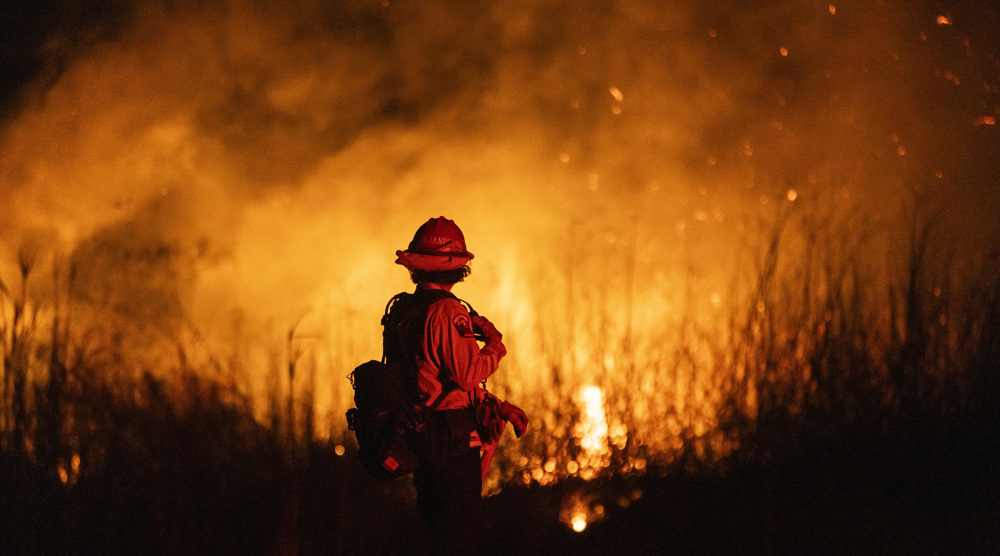Iran: Israel talking non-proliferation like mafia speaking of respecting laws against crimes
Iran has stressed it is pursuing a fully transparent nuclear program, hitting out at nuke-armed Israel for talking about adherence to non-proliferation principles.
“Israel talking about commitment to non-proliferation [treaties and principles] is like mafia speaking of adherence to laws against organized crimes,” Iran’s ambassador to the International Atomic Energy Agency (IAEA), Kazem Gharibabadi, told a meeting of the IAEA Board of Governors on Wednesday.
The envoy said certain “baseless allegations” raised by the Israeli regime were “nothing but a political game to spoil the current positive trend in Iran-IAEA cooperation.”
“This regime is not a member of any non-proliferation or disarmament treaties and builds different types of weapons of mass destruction,” Gharibabadi said, adding that given “the regime’s long-standing record of non-compliance with all international norms and standards, its representative is in no place to lecture others on issues that the regime does not commit to.”
“The Israeli regime talking about commitment to non-proliferation is like mafia talking about compliance with laws against organized crimes,” he added.
The envoy also denounced a “US-Israeli plot,” to put pressure on the IAEA, describing it as a last-ditch effort to kill the 2015 Iran nuclear deal and disseminate “distorted information” to world countries and the global public opinion.
“We are witnessing a US-Israeli plot with the support of their affiliated media. Former national security advisor John Bolton's remark wishing to set an agenda for the visit of the acting director general on the night that he was on his way to Tehran, along with the media campaign done by two news agencies, as well as the show played by the Israeli Prime Minister (Benjamin Netanyahu) all in all indicate that a joint project is underway,” he said.
He said that Iran did not attach any value to and would not be influenced by such attempts, warning that “any bid to derail the active and constructive cooperation between Iran and the IAEA and put undue pressure on the IAEA in this regard will prompt Iran’s befitting responses.”
Gharibabadi also stressed that all of Iran’s nuclear activities were fully transparent and verified by the UN nuclear agency, adding, “There is no covert nuclear activity” in the country.
The remarks came a day after US Secretary of State Mike Pompeo on Tuesday accused Iran of lack of full cooperation with the IAEA and possible undeclared nuclear activities.
The US allegations also came a day after Netanyahu accused Iran of operating a secret site towards obtaining nuclear arms and called on the international community to join Washington’s economic sanctions on Tehran.
Iranian Foreign Minister Mohammad Javad Zarif responded to Israel’s claims on Twitter, saying, “The possessor of REAL nukes cries wolf—on an ALLEGED ‘demolished’ site in Iran.”
Israel, which is the sole possessor of nuclear weapons in the Middle East, has a policy of deliberate ambiguity about its nuclear program.
Saudi Arabia following 'opaque' nuclear program
Elsewhere in his remarks, Gharibabadi also commented on Saudi Arabia’s nuclear ambitions pursued under the auspices of US President Donald Trump.
He said the kingdom was developing a “very opaque and vague” nuclear program, adding that although Riyadh had signed the nuclear Non-Proliferation Treaty (NPT), it followed the IAEA’s small quantities protocol.
Saudi Arabia signed in 2005 the so-called small quantities protocol with the International Atomic Energy Agency, which exempts countries with no or minimal nuclear programs from inspections.
Riyadh, which is constructing a nuclear reactor, has so far resisted calls by the IAEA to implement proportionate safeguards and an inspection regime that would prohibit possible deviation towards weaponization.
Gharibabadi said Saudi Arabia’s policies were regrettably supported by the US government for political and economic gains.
He said countries must make it clear to Saudi Arabia that the international community will not tolerate any deviation from a peaceful nuclear program.
Saudi Arabia has announced plans to spend $80 billion to build 16 nuclear reactors over the coming two decades.
Back in March, US Energy Secretary Rick Perry approved six secret authorizations by companies to sell nuclear power technology and assistance to Saudi Arabia as the Trump administration has quietly pursued a wider deal on sharing US nuclear power technology with the kingdom.
Analysts have warned that a nuclear Riyadh under its “reckless” leadership would pose a threat to the countries in the region.
“The small quantities protocol was designed to simplify safeguards for states with minimal or no nuclear material, but it is no longer adequate for Saudi Arabia's expanding nuclear program,” Kelsey Davenport, director of Nonproliferation Policy at Arms Control Association, told Middle East Eye in June.
US lawmakers have also expressed concern that sharing nuclear technology with Saudi Arabia could lead to a nuclear arms race in the Middle East.
'Capitulation': Israeli officials and media concede Gaza defeat as truce unfolds
'Gaza has won': Social media users react to ceasefire with mix of relief, joy
Iran seeks South Korea’s assistance for AI, fiber-optic projects
VIDEO | Iran's 'Eqtedar' (Power) maneuver
Israel hits HTS military target in Syria for 1st time since fall of Assad
VIDEO | Press TV's news headlines
Israel has slaughtered 13,000 students in Gaza, West Bank
VIDEO | More Zionist than Zionists: Biden’s legacy to be defined by Gaza genocide












 This makes it easy to access the Press TV website
This makes it easy to access the Press TV website